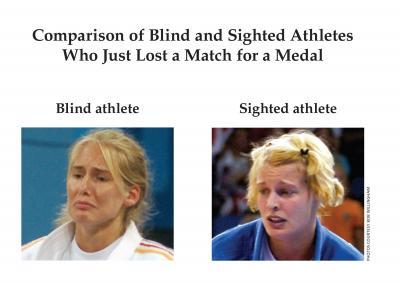I was listening to th e radio this morning and heard the fact stated that blind people use the same facial expressions as sighted people because facial expressions are innate rather than learned. This means that blind people don’t have to have seen a facial expression for
e radio this morning and heard the fact stated that blind people use the same facial expressions as sighted people because facial expressions are innate rather than learned. This means that blind people don’t have to have seen a facial expression for
sadness or joy or anything really to know what it looks like, because it is something we all do automatically. Facial expressions are passed down just like hair colour or hitchhiker’s thumb.I looked up the original study this information was based on – you can read the press release on the American Psychological Association website here (or get a hold of the journal article referenced within if you’re super keen 🙂 )
When I looked up this article about facial expressions, a sidebar also caught my eye. It was about blind people and dreaming. Everyone dreams, even though many times we can’t remember what we dreamed. Most of my dreams are in pictures, so what would dreaming be like for someone who has never seen? Interestingly, if a person has lost their sight post approximately age 7, they still dream in pictures. If they lose their sight earlier though, they dream in the way the experience the world, not in pictures but in smells, sounds, touch and spatial awareness of the situation.
This reminded me of the series on Discovery Channel a few years ago about senses. The Human Body – Pushing the Limits, was about the amazing power of our bodies, including the senses. (You can watch some excerpts here) At one point in the first episode, they explore surgery that restores sight to blind people. The person who lost their sight in a car accident at age 19 does very well and seems happy. The person who lost their sight at age 3 though really struggled. It seemed that by losing his sight so early, he hadn’t developed many of the skills involving judging distances and timings that sighted adults have. He found it easier, even after regaining his sight, to use his cane when out and about to judge surfaces, kerbing etc.
In the July OUASSA camp, we are going to be participating in a New Zealand International Science Festival event called “Dining in the Dark”. At this event, we will dine blindfolded in the dark to experience what it is like to be non-sighted. We will also have guest speakers, a blind member of the community to talk about the challenges of living with blindness, and a researcher from Otago who will talk to us about why she teaches in the dark. (see more here)
The idea of dining in the dark is not new, restaurants like Unsicht Bar in Germany have been running for years in the dark. Guests have noted that eating in the dark means they experience their meals in a completely different way, becoming more aware of texture, smells and temperature. “The slices of lamb felt delicious, they smelt even better and the salt grass seemed to spread out before me as I chewed. Each sip of Italian Sauvignon was preceded by what can only be described as a nasal feast of its own.” (from The Independent, you can read the full review here)
The idea of our other senses compensating for a lack of sight has been around for a long time. To actually experience it though is quite amazing. Losing sight, even temporarily, causes us to rely on the rest of our senses for all of our information about the world around us. This experience allows us to reflect on the world that blind people experience every day and discover how amazing our brains are at interpreting information and adapting to circumstances.






Recent Comments